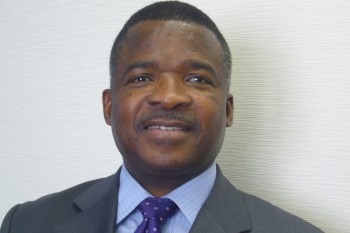Events

Novembr 2016
H. E. Mr. Jacob Dickie Nkate, Ambassador of the Republic of Botswana
UPDATE: Mar 17, 2017
Hoping for Japanese Technological Supports for Economic Diversification and Less Dependence on Mining
—– Botswana celebrated the 50th anniversary of its independence from Britain this year. How would you describe the features of Botswana to the Japanese people?
Botswana is a country with a multi-party system, and one of the very few true democracies in Africa. It is politically stable, and our people enjoy freedom in the context of democracy. One of the world’s largest diamond mines was discovered shortly after the independence; and since the 1970s, our government has been using the revenue from diamonds for economic development and improvement of people’s lives. Botswana is peaceful as well as beautiful with abundance of nature. It is also a safe country, and we welcome visitors from Japan.
—– Botswana has been maintaining the average annual GDP growth rate of 5% over the past decade; and the country is assessed as a development success story by the World Bank. How did Botswana achieve this success?
Botswana utilizes the diamond resources for economic development and has been sustaining high economic growth. We maintain a close friendship with other countries, and received economic support from the east and the west even during the cold war. We also strictly administer our 5-year development plans. Botswana is a multi-racial country, but manages to maintain the consensus as one nation and we avoid political conflicts by making policy decisions based on the consultation between the ruling party and opposition parties. This was at the base of our successful economic development.
—– How do you see the current Botswana-Japan relations? What is your priority mission to reinforce the bilateral ties?
We currently have the finest and friendliest relationship with Japan. A number of Japanese companies are interested in government contracts to develop the infrastructure. And the economic ties are reinforced through adoption of the Japanese Digital Broadcasting standard and expansion of the JOGMEC Remote Sensing Center, etc. We particularly appreciate the Japanese educational and work ethic training and the technological and personnel training supports by young volunteers under the auspices of JICA. We are happy that many JICA experts and volunteers continue activities privately even after their assignments are completed. Botswana cooperates with Japan in global issues and the UN-related efforts, and is in favor of Japan to become a permanent member of the expanded Security Council in the future. My priority mission is to continue expanding the cooperative ties in the economic, political, and diplomatic/cultural fields.
—– What are the medium and long-term challenges for the development in Botswana? Are there any areas where Japanese companies can collaborate with Botswana to turn those challenges into business opportunities?
Botswana’s medium- to long-term challenges are economic diversification with less dependence on diamond mining, and development of other sectors such as tourism, transportation, and financial services. We are hoping for not only investments but also for transfer of knowledge and technologies from Japan. We have become an upper-middle income country, but need to foster the IT industry to become a knowledge-based society and move away from the mining sector. Botswana has a high unemployment of 17% particularly among the youth, which needs to be corrected. While working on economic diversification, our government is trying to revitalize agriculture and support unemployed people to start business.Botswana is a small country, but is a member of Southern African Development Community (SADC) with a population of 230 million. We are hoping that Japanese companies will assist SADC with wide-area development including transportation networks.
—– Would you tell us about the mission and recent activities of SADC?
SADC originally started as a political organization to help the movement against racial oppression in Southern African nations in the time of Apartheid. In the late 1980s, it was reorganized as a group working toward economic integration of the region, and the office was set up in Botswana’s capital, Gaborone. SADC member countries aspire to be economically integrated into one market. At the Sixth Tokyo International Conference on African Development (TICAD VI), the 3 pillars were identified, which are economic diversification through industrialization, resilient healthcare systems, and social stability. Likewise, SADC promotes diversifying economy via strategic industrialization. Through the TICAD partnership for economic growth and access to healthcare and education, we must make sure that every part of African citizens can experience social inclusion. We look forward to having cooperation from Japanese companies.